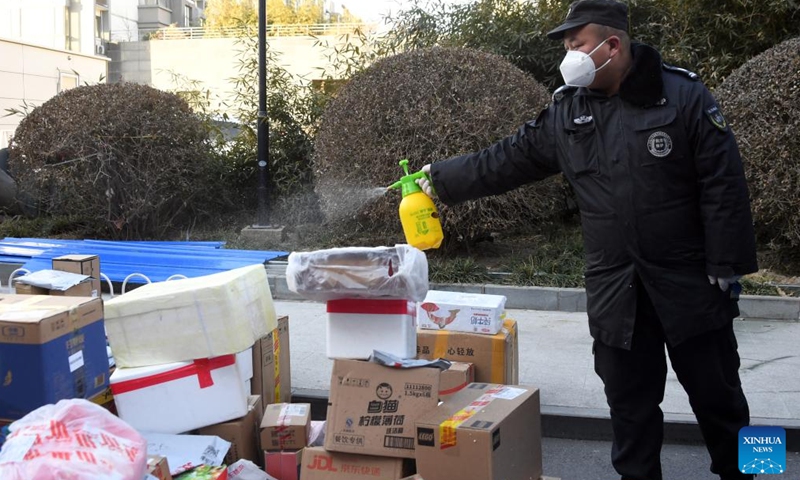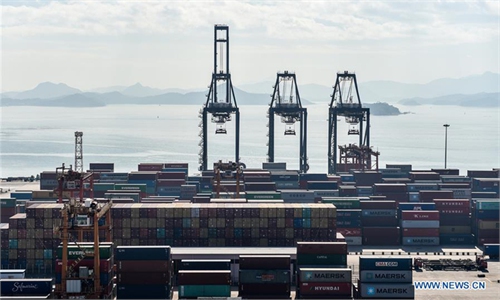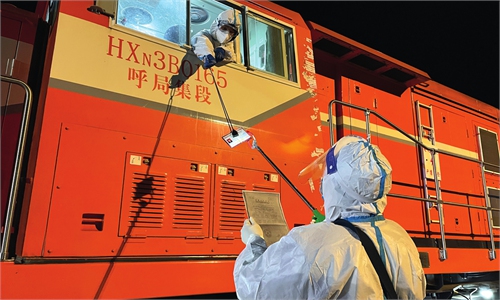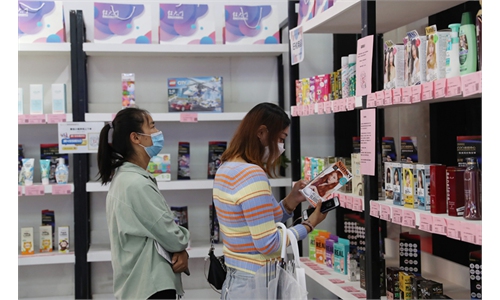Chinese, foreign couriers vow enhanced disinfection of inbound parcels after Omicron cases

A staff member disinfects parcels to be delivered to residents at a residential area in Haidian District of Beijing, capital of China, Jan. 16, 2022. Photo:Xinhua
Chinese and foreign courier companies vowed to strictly follow virus prevention and control rules in China, including disinfecting the outer packages for all imported goods and placing virus warning labels on the packages, as the country moves to stop the spread of the Omicron variant through international packages after two suspected cases.
Germany's DHL said that it strictly implements epidemic prevention and control measures. "At present, the epidemic prevention and control situation remains complicated and severe. We will continue to strictly carry out various specific tasks in accordance with the new requirements and instructions from the competent authorities," DHL told the Global Times on Tuesday.
US-based FedEx said its business across China is operating normally and the company continues to adhere to instructions from relevant departments in implementing COVID-19 control measures.
"The outer packages of all imported goods are disinfected multiple times before delivery… notification stickers are also placed on the outer packaging of imported goods," FedEx told the Global Times in a statement on Monday.
Alibaba's logistics arm Cainiao told the Global Times that it was tightening regulations for some warehouses, including disinfecting floor mats in order to sterilize employees' footwear.
"We encourage 100 percent of our employees to be vaccinated and take the booster," the company said.
SF Express, a major Chinese courier firm, also said it disinfects parcels, equipment, facilities, and vehicles twice a day.
The enhanced disinfection measures came after at least two cases of the Omicron variant - one found in Beijing and another one in Shenzhen - were suspected to be related to packages from North America.
On Tuesday, a property management company in Beijing's suburb Shunyi district received a parcel tested positive for the virus, Beijing Daily reported.
In a notice released on Monday, the State Post Bureau of China suggested that people should reduce mail and express delivery of goods from countries and regions with a high risk of COVID-19 in order to prevent transmission of the virus through international mail.
The bureau vowed to "build a barrier" against COVID-19 cases imported through international express mail.
A Beijing health official also called for reducing purchases of imported goods via cross-border e-commerce platforms during Monday's press conference, as the Beijing 2022 Olympic and Paralympic Winter Games and Spring Festival approach.
Yang Zhanqiu, a Wuhan-based virologist, told the Global Times on Monday that as the overseas epidemic is still rampant, chances are high that those contaminated international packages sent to China would cause domestic outbreaks.
The virus on an international package could spread to the respiratory tract of the person in contact with it, through viral particles that were blown by the wind and floated in the air, though the chance of packages or papers spreading the virus to people via aerosol transmission is low, Yang noted.
Cross-border e-commerce, or Haitao in Chinese, became a niche trend in China due to the country's mature logistic network and the burgeoning growth of China's e-commerce sector.
In 2020, the market scale of import via e-commerce in China reached 205 billion yuan ($32.32 billion), which is expected to grow at an annual rate of around 25 percent during 2021-25, according to iResearch.
Tmall Global under Alibaba, Kaola, and JD.com are among the popular Haitao platforms in China.
During the Spring Festival holidays in 2021, imported beverages, alcohol and cherries were popular items on the Tmall Global platform, with turnover rising 60 percent year-on-year.
Official statistics showed that China's e-commerce sales surpassed 120 billion yuan during the Spring Festival holidays in 2021 as buying online became increasingly popular among young Chinese consumers.
Tmall Global and Kaola did not respond to the Global Times requests for comments on any impacts of their businesses from the latest anti-epidemic measures as of press time on Tuesday.



